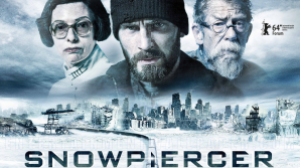Occasionally, a movie will stick with me for weeks and months afterward. Sometimes, it’s a movie like Frozen with its tenacious “Let It Go” song, which won’t do what it suggests. Then there are movies of powerful truth and humanity like Lars and the Real Girl and Babbette’s Feast which grow deeper with each viewing. And then there are movies which stick with me because they disturb me, for better or for worse: Magnolia, Fight Club, American Beauty, and so on. Snowpiercer belongs to the third category.
I will try to avoid spoilers as much as possible, but I’m afraid that’s not totally possible. So, read at your own risk.
Snowpiercer is a post environmental apocalypse movie. An attempt to stop global warming leads to the opposite extreme. The earth is now too cold for humans to survive out of doors. But one visionary man foretold the disaster and with his fortune built a railroad that spans the globe. Its single but very long train never stops. It just winds its way over desolate continents with the last remnants of humanity on board. It’s an ark of sorts.
But as the story unfolds, the question remains: Are these humans worthy of being saved? As the recent Noah movie (lamely) tried to show, in the words of Aleksandr Solzhenitsyn, “If only it were all so simple! If only there were evil people somewhere insidiously committing evil deeds, and it were necessary only to separate them from the rest of us and destroy them. But the line dividing good and evil cuts through the heart of every human being” (from The Gulag Archipelago).
The Noah movie isn’t so sure if humans are worthy to be saved. But saved we are. Snowpiercer is sure. We are not to be saved.
Snowpiercer presents a humanity that is depraved beyond redemption. There are the unwashed masses in the back of the train who are vermin who eat vermin. Their children are useful as tools for a failing technology, inserted into the engine like cogs to keep it running. And the wealthy passengers at the front of the train are so given over to despair that all that’s left to them is their base animal passions which they indulge in to excess. And then there’s the overly pragmatic engineer who encourages occasional rebellions from the rear of the train in order to reduce the headcount in an overpopulated and very limited ecosystem.
What is all comes down to is this: Humanity is a train wreck that shouldn’t be saved or wept over. It’s time to hand the planet over to … polar bears. Yep, polar bears.
The uncomfortable truth of the movie is that its judgment of humanity is correct. We are a train wreck. We should be covered over by a purging, cleansing flood. We should spin off the rails and be left as a smoking heap in the wasteland we’ve created. As Solzhenitsyn wrote, there’s evil in all of us.
But what to do with that evil is where the biblical story and the Snowpiercer story part ways.
In Snowpiercer, the heroic savior figure meets with the semi-divine engineer, and it looks like there might be an agreement to keep running the machine the way it’s been run. Not truly saved, but still hanging on to life for a few more trips around the globe. But that’s not to be. Humanity’s turn it over. We aren’t able to be saved. It’s time to give some other creature dominance of the planet.
The Jesus story is vastly different. While agreeing that humanity is wretched, the Jesus story never gives up on the imprint of God on each one of us. We are created in the image of God and are therefore always redeemable. Therefore, God enters into our huddling masses and one us and atones for horrors we perpetrate on one another and on the rest of creation. And though we are left in much of our self-made predicament, Jesus promises to continue his saving work by fully restoring our divided hearts and the broken creation to what he intended when he created us in the first place. Polar bears included.
The Snowpiercer story was originally a French graphic novel before becoming a South Korean movie and then an American movie which earned an amazingly high 95% fresh rating on Rotten Tomatoes. In other words, its a story that has resonated deeply in European, Asian, and North American cultures. We are sick of ourselves. We are sick of what we’ve done to the planet. We are sick of economic inequity. We are sick of our perversity. We’re sick of the cogs technology turns us into. We’re so sick of ourselves that we’re willing to just be done with ourselves, to pull the plug on humanity and call ourselves a failed project.
Jesus says an emphatic NO to this storyline. It was to the most wretched of us that he connected the most, offering his own death to save us from our crazy train trajectory. In the midst of our Snowpiercer despair, Jesus says an emphatic YES to humanity, to creation, to hope, to the possibility of redemption and restoration. His is the story I’m sticking with.
[QUICK EDIT: The version of the movie I saw was missing subtitles. They don’t figure into most of the movie, but apparently I missed a key subtitle toward the end which gave some hope about the possibility of the winter coming to an end. I didn’t see evidence to that effect myself, but I did want to acknowledge it. For that reason, too, I want to include the following link, which acknowledges disagreement among viewers as to if the ending is optimistic or pessimistic: http://www.vulture.com/2014/07/snowpiecer-movie-discussion.html]
[EDIT #2: For an exceptional analysis of the movie that picks up on many themes I didn’t, see: https://www.youtube.com/watch?v=Bm9qKj1Q_OU&index=3&list=PLwg4AG1KkgLwP5FuUIiVEy-ILMD23AN1v]


